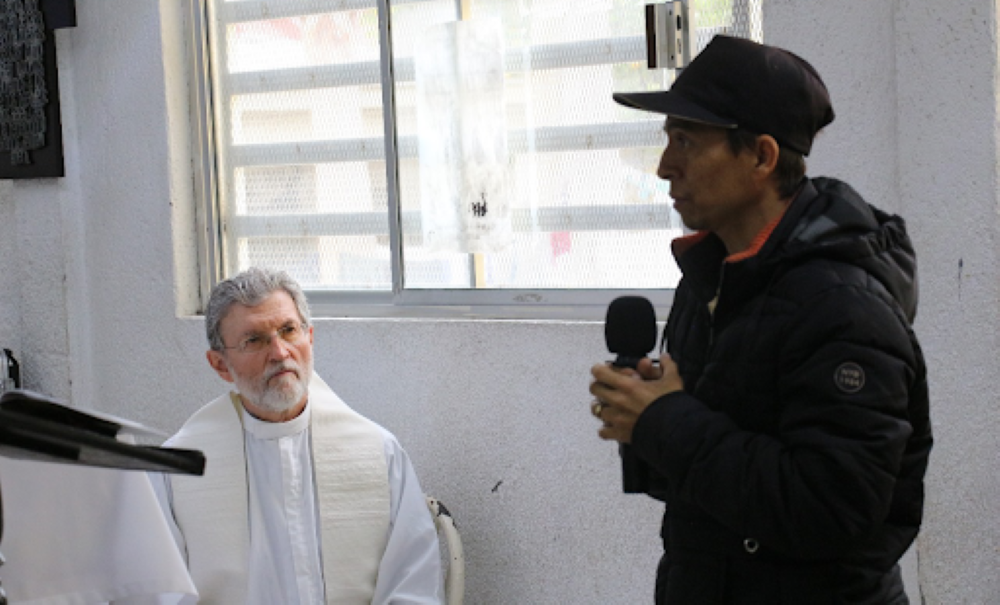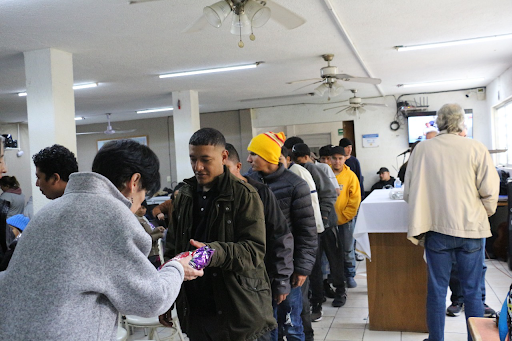Migrant children play at an outdoor playground at Casanicolás in Guadalupe, Mexico. Casanicolás provides shelter, medical and legal support to thousands of Central and South American migrants every year. (Julieta Valdez)
Hector, a tall young man from Honduras, opens what looks like the door to a high-security facility. He greets a family of four migrants who have arrived from Venezuela and welcomes them to Casanicolás shelter.
The couple and their two young children have traveled for several months with just a backpack and a few essentials inside. They have sunken eyes, severe sunburn and badly blistered feet.
The Archdiocese of Monterrey, Mexico, founded Casanicolás in 2004. "Just as the Mexican government demands a just treatment of our emigrants in the United States, it should respect the rights of those who come from Central America," Msgr. Luis Eduardo Villarreal, then director of social ministry for the archdiocese, said at the time.
Casanicolás provides shelter, medical and legal support to thousands of Central and South American migrants every year.
When Hector showed them around the house, with its bedrooms with clean sheets, showers and a laundry area, the Venezuelan family smiled. They said they were exhausted from walking and sleeping under bridges, and are thankful to Casanicolás for beds to rest in.

Msgr. Luis Eduardo Villarreal listens during Epiphany Mass at Casanicolás on Jan. 7 as Carlos describes traveling through the Darien jungle between Colombia and Panama and traveling on the Mexican freight train known as "the beast" or "train of death." Carlos, his wife and their two toddlers came from Venezuela. (Julieta Valdez)
To get to Guadalupe, a city 230 miles south of the Texas border, the Venezuelan family crossed 2,500 miles of rivers, jungles and cities. They traveled by bus, boat and on foot. They spent most of their money on overpriced transportation, and extortion by local crime gangs.
Hector, 26, arrived at Casanicolás with his 24-year-old brother, Tony, in November. Both are construction workers. "My father taught us construction," he said. "We are hoping to reach my uncle who is a drywaller in South Carolina and work with him," he told NCR.
When Hector and Tony reached Guadalupe by bus, after crossing most of Mexico, young volunteers were handing out flyers about Casanicolás' shelter.
"My brother and I feel happy and blessed to have found Father Luis Eduardo," he said.
"We ran a few miles from the bus station to Casanicolás. I can't thank him enough for giving us a place to rest and eat and feel safe," Hector said. He now helps out at the shelter, receiving and accommodating new migrants that come by the dozens each day to knock at the doors.
From 2019 to 2023, Casanicolás sheltered 4,000 to 7,700 migrants per year. Since 2021, the number of adults accompanied by minors has increased.
"My brother and I decided to escape Honduras because you cannot live there anymore. There are many crime gangs that kill you and rob you randomly and [you] have no jobs. We felt immense sadness leaving our parents but our dream is to find a job in construction and help back home," Hector said.
"The hardest part of our journey was the cold weather, sleeping on the sidewalks and parks. We felt we were going to freeze to death," Hector said.
For William, a 45-year-old Venezuelan blacksmith who left his country to better provide for his two daughters and two grandsons, Monterrey is the last stop. "Crossing the Darien jungle was hell on earth. We were still on a boat trying to cross the river and a group of gang members with arms were already waiting for us on shore. They kidnapped and threatened to cut our hands if we didn't give them our few possessions.
"I've decided to stay in Mexico where Father Villarreal helped me get a work permit and a job in a metal factory," he told NCR. He said he couldn't survive any more violence. "The criminals stole all our money, beat us, intimidated us, took all our food and cellphones. I thought I was going to die. I prayed and asked God to protect us with his holy mantle," William said.
Casanicolás has also contracted with an immigration lawyer who helps migrants fill out forms that allow them to schedule appointments to apply to stay in Mexico, through the Mexican Commission for Refugee Assistance.

Volunteers at Casanicolás commemorated the visit of the Magi bearing gifts to the Christ child by distributing presents to migrants at the shelter on Jan. 7. Migrants from Venezuela, Guatemala, Nicaragua, Cuba and Salvador received toys, clothing, hats, scarfs and backpacks. (Julieta Valdez)
Villarreal, ordained 42 years ago, has been the parish priest of the Church of San Francisco Xavier, a few blocks from Casanicolás, since 2002.
"Casanicolás is an apostolate of the parish of Saint Francis Xavier. We started receiving migrants in 2008, and ever since 15 years ago, we've been sheltering them every day," Villarreal told NCR.
Casanicolás, named after St. Nicholas of Tolentine, includes 130 beds across three buildings, one for women and two for men.
"Our migrants arrive in Casanicolás worn out and traumatized by the mistreatment they receive in national territory. Here in Mexico is where the migrants suffer the most on their journey. Extortion, kidnapping, robbery, beatings, threats … it's hell," Villarreal said.
The priest is also a professor at Universidad Libre de Derecho, a law school, where he teaches socioeconomic problems of Mexico and oversees an immigration law clinic.
"The migrant is a good person, who contributes work, culture and life projects to the places where he or she arrives; the rest are myths and not realities," Villarreal said.
"In Nuevo León the phenomenon of migration is very strong, in such a way that Monterrey, the capital, has not only become a place of passage, but also a place of origin, destination and return of forced migration," he said.
"Casanicolas' vision is to humanize human mobility," said Philippe Stoesslé, professor-researcher of law and social sciences at the University of Monterrey.
"I admire Monsignor Luis Eduardo. Having achieved so much, he is an extremely humble person. He is very close to his parishioners and the migrants at the shelter," he said.
"Villarreal has taught me a deep understanding of Christian mercy, which includes welcoming migrants, but also one that includes protection, security, warm human treatment, guidance and spiritual accompaniment, knowing the people by name and not just as numbers.
"He has a vision of mercy, empathy, infinite compassion and human rights. He is sensitive to the protection and promotion of human rights, which goes hand in hand with his Christian profile of guaranteeing dignity to all human beings," Stoesslé said.
The city of Monterrey, 140 miles southwest of McAllen, Texas, is chosen by thousands of migrants because it is geographically situated for easy travel routes to several U.S. destinations. Guadalupe is about 3 miles east of Monterrey.
In December, Texas Gov. Greg Abbott signed a law that allows state and local law enforcement to arrest people suspected of having crossed the border between ports of entry. Another bill allocates $1.5 billion toward building barriers along the Texas-Mexico border.
Advertisement
"What is happening in Texas, I think, is the paroxysm of the securitization of migration where migrants are considered harmful objects, there is a total reification of migrants and are considered a threat to national security," Stoesslé said.
"And for a long time there has been a criminalization, not only legal and criminal, but a social criminalization where the migrant is seen as a pathogenic and threatening factor and is what causes this totally broken approach," he said.
Last year, Abbott ordered the deployment of a 1,000-foot line of buoys with blades and mesh on the Rio Grande River, as part of an initiative aimed at deterring illegal border crossings.
"I think it's barbaric regardless of the fact that it could kill or maim people. This is not only a militarist approach to securitization but apart from that it does not work, the more complex the migratory transit is, those who profit from this are mafias that increase their rates and take advantage of this impossibility to profit and threat lives," Stoesslé said.
Villarreal told NCR that Casanicolás' fundamental purpose is theological.
"We want to give a response to the Gospel, because we believe in the project of the Gospel," he said. "A project of brotherhood and solidarity between one and other. And this shelter is a sign that it is possible that the last shall be the first."







